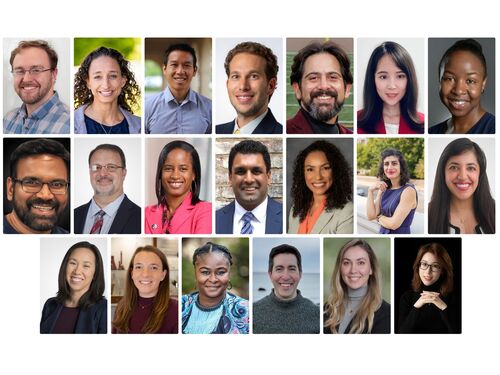Report Calls for U.S. to Align Equity and Emerging Science, Technology, and Innovation in Health and Medicine
News Release
By Megan Lowry
Last update August 22, 2023
WASHINGTON — A new report from the National Academies of Sciences, Engineering, and Medicine and the National Academy of Medicine (NAM) presents a governance framework to align emerging science, technology, and innovation in health and medicine with equity. As innovations in gene editing, regenerative medicine, artificial intelligence, and many other areas are increasingly used in clinics and daily life, a new framework for how to fairly distribute the potential benefits of these technologies is needed, says the report.
Synthetic biology, neuroscience, biomanufacturing, and communications, among other fields, are rapidly progressing and have produced technologies with the potential to transform medicine and society. At the same time, disparities in hospitalization and death as well as challenges in distributing limited vaccines and therapeutics fairly during the COVID-19 pandemic reveal stark inequities in who benefits from advances in health care and medicine.
Toward Equitable Innovation in Health and Medicine: A Framework recommends that the White House Office of Science and Technology Policy provide guidance to federal agencies and departments that oversee science and technology in adopting this new governance framework, as well as convene a new Equity in Biomedical Innovation Task Force to galvanize action. The report’s framework also recommends reorienting the culture of innovation, incentivizing equity, expanding participation of underrepresented and underserved communities in innovation, developing equity science, and creating and promoting equity playbooks targeted to specific areas of emerging science.
The report says each stage of an emerging technology’s development — such as study conception and design, funding approvals, continued investment, and product access and accessibility — is an opportunity to align technology innovation with the ideal of equitable benefits across society.
“Equity and fairness concerns have systematically received less attention and action than other values in health and science innovation,” said Keith Wailoo, co-chair of the committee that wrote the report and Henry Putnam University Professor of History and Public Affairs at Princeton University. “Our report pursues a new vision: The innovation system that produces our biggest medical and health breakthroughs should strive to account for everyone’s needs.”
“Our report’s recommendations for making innovation in health and medicine more equitable hinge on the perception and embrace of a common mission by multiple groups,” said Keith Yamamoto, committee co-chair and vice chancellor for science policy and strategy, director of precision medicine, and professor of cellular and molecular pharmacology at the University of California, San Francisco. “This will require not only convening experts from different disciplines but building coalitions among affected communities, funders, and government as well.”
In January 2020, NAM established the standing Committee on Emerging Science, Technology, and Innovation in Health and Medicine to consider potential societal, ethical, legal, and workforce implications of emerging science, engineering, and technology, and to incubate ideas for a governance framework aligned with ethical principles. To build on and advance this work, the National Academies of Sciences, Engineering, and Medicine and the National Academy of Medicine convened a new committee of experts to produce this report.
“This report is a critical step toward creating an equitable governance framework for emerging science and technology, which is among the NAM’s top strategic priorities,” said Victor J. Dzau, president of the National Academy of Medicine. “We should view equity as not only as an ethical issue but an imperative for those at the cutting edge of innovation in health and medicine. If we can shape the next generation of medical technologies and innovations to serve the public equitably, imagine what we could achieve for American and global health in the coming decades.”
Reorienting the Culture of Innovation
The research and development enterprise in health and medicine should more fully incorporate equity considerations into its foundational ethical principles, the report says. This will require reorienting the culture of innovation across all sectors toward equity, especially in organizations that establish norms or conduct oversight, such as research funders, universities, private companies, and licensing and patent offices. For example, this could include requiring training that raises awareness of the consequences of misaligned innovation and equity, or incorporating equity into technology licensing and investment.
Incentivizing Equity
Those who fund and oversee innovation in health and medicine should incentivize grant recipients and researchers to assess an emerging technology’s alignment with equity, focusing on key points during a technology’s life cycle — such as funding approval, patenting, or cost and coverage decisions. Grantees should also be incentivized to explore actions that can be taken to mitigate misalignments between innovation and equity. For example, where appropriate to the nature and type of research, funders can use equity-focused proposal requirements and scoring elements when reviewing proposals.
Developing a Robust Equity Science
Metrics, methods, and benchmarks are needed to guide decision-making about equitable innovation, and a robust field of equity science is needed. The National Institutes of Health and National Science Foundation should partner with philanthropy to support the development of equity science, establishing a wider range of qualitative and quantitative methods. These efforts should enable improved assessment of how inequities in innovation arise and for whom, how innovation systems and processes can change, and near- and long-term changes that may happen in response to governance choices.
Expanding Participation
The report says it is necessary to expand who participates in health and medicine innovation at all stages of the innovation life cycle, and recommends systematically engaging and empowering diverse communities to participate in the innovation system — from research priority setting and funding through design conception, intellectual property management, and assessment of impacts and outcomes. Experts and practitioners in community engagement should analyze lessons learned from past efforts and identify best practices, standards, and tools for maintaining engagement with marginalized or underserved communities. Funders can also support enhancement of communities’ ability to participate in research and development partnerships.
Creating Equity Playbooks
Innovation stakeholders should develop equity playbooks that can provide strategies, key questions, and advice that is targeted to particular elements in the technology life cycle or specific areas of emerging science, the report says. These playbooks would provide guidance, strategies, and tools that operationalize the report’s governance framework. Inclusion of historically marginalized and underserved communities in playbook creation is one important mechanism for enhancing the participation of these groups in the innovation system.
Undertaken by the Committee on Creating a Framework for Emerging Science, Technology, and Innovation in Health and Medicine, the study was sponsored by the Gordon and Betty Moore Foundation, Public Interest Technology Infrastructure Fund, Qualcomm Inc., Robert Wood Johnson Foundation, Schmidt Futures, and the Greenwall Foundation.
The National Academies are private, nonprofit institutions that provide independent, objective analysis and advice to the nation to solve complex problems and inform public policy decisions related to science, engineering, and medicine. They operate under an 1863 congressional charter to the National Academy of Sciences, signed by President Lincoln.
Contact:
Megan Lowry, Media Relations Manager
Office of News and Public Information
202-334-2138; email news@nas.edu
Featured Publication
Toward Equitable Innovation in Health and Medicine: A Framework
Consensus Study Report
·2023
Advances in biomedical science, data science, engineering, and technology are leading to high-pace innovation with potential to transform health and medicine. These innovations simultaneously raise important ethical and social issues, including how to fairly distribute their benefits and risks. The...
View details
More like this
Discover
Events
Right Now & Next Up
Stay in the loop with can’t-miss sessions, live events, and activities happening over the next two days.
NAS Building Guided Tours Available!
Participate in a one-hour guided tour of the historic National Academy of Sciences building, highlighting its distinctive architecture, renowned artwork, and the intersection of art, science, and culture.



